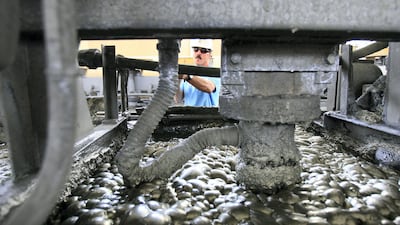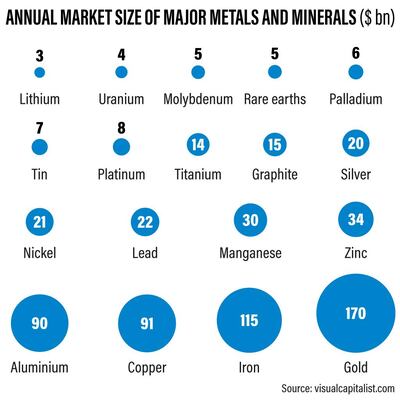When crude oil was first unearthed, it transformed the fortunes of those countries with vast reserves. But as oil and gas reserves mature, many countries are now tapping into other natural assets such as gold, iron and other rare earth minerals.
Last month, Egypt reported a 1-million-ounce gold deposit, deep in the eastern desert. A few weeks later, a $1 million (Dh3.6m) cobalt deal between Morocco and German car maker BMW was announced. Morocco has large reserves of cobalt, an essential ingredient in automotive batteries, which is now one of the world’s most valuable minerals.
These are just the latest countries to recognise that minerals are just as potentially valuable a resource as oil or gas. Nigeria, the largest African oil producer, is also looking at mining as a way to lessen its reliance on crude exports.
"Nigeria is a rather large economy not to have its own domestic iron ore and steel production industries," David Turvey, managing director of Kogi Iron, an Australian company developing both an iron mine as well as a processing mill in the country, told The National.
The plan, he says, is not to export the ore, but to use it locally to feed Nigeria’s emerging industrial base. The adoption of mining-friendly laws was crucial to the decision.
“We’ll be looking to build a steel plant. That steel plant will be directed to replacing the imports the country currently has in steel.”
Policy is crucial when developing a mining sector. Previously, energy producers have tended to place mining under their respective oil and gas ministries. Some also require joint state-participation, a model often used successfully in oil producing countries such as Nigeria.
But mining companies, with large upfront capital spend, prefer to avoid this approach.
It is no coincidence that Egypt’s announcement came shortly after it updated its mining code, moving away from top heavy legislation that required extensive state participation in mineral projects. The result could be a billion-dollar windfall for the country – and that is just related to discovered gold deposits, not what still remains to be found, according to minister of petroleum and mineral resources, Tarek El Molla.
The North African country hopes to attract foreign investment through the industry.
The separation of mining from energy production is crucial, if the former is to prosper. The two sectors have very different capital structures, making it difficult to fit them into the same policy framework.
With oil for instance, upfront development costs tend to be lower. But it becomes more expensive at a later stage with transport, storage and especially refining devouring an increasing amount of capital.
A study by the Department of Energy of Allameh Tabataba’i University in Iran found that it took around $15m to establish an on-shore oil well in the sanction-hit country. Another study by the mining unit of KPMG in Johannesburg found that a new mine required at least $100m. Even the initial exploration phase, when prospectors actively seek out new deposits, carries a large cost with little guarantee of a return.
“It will be $5m-10m a year that has to be spent, and most mining investors won’t want to take this on unless they have some support from government,” says James Campbell, chief executive of Botswana Diamonds, which is now prospecting for new gem deposits across the country.
Countries such as Canada and Australia have arguably managed it best. Both have strong energy sectors and a mature mining sector, producing diamonds, iron ore and other minerals. Both provide generous tax breaks for prospectors, reducing the risk of exploration.
Mozambique in southern Africa has essentially adopted Australia’s investment-friendly gas and mining laws for itself. The result is billions of dollars of inward investment to develop its vast offshore gas deposits as well as inland mineral deposits of graphite, tantalum, and coal, among others.
For countries that get it right, the payoff can be big. Saudi Arabia last year removed mining from a sub-department of its energy ministry, creating a new, separate mining ministry.
Albara'a Alwazir, economist for the Saudi-US Business Chamber, recently published an extensive overview of Saudi Arabia's mineral resource potential. The kingdom wants to lessen its dependence on oil, and has an abundance of unexploited mineral wealth to help it achieve this goal, he told The National.
“Saudi Arabia is endowed with a significant mineral base which it plans to use for domestic production and to become an export leader across a number of minerals, including gold, copper, phosphates and aluminium.”
Mining not only provides an alternative income stream and jobs; it can also support wider industrialisation efforts. Mr Alwazir says the Opec's largest producer wants to become a regional manufacturing hub for numerous sectors, automobiles in particular. It will therefore rely on the mining sector’s downstream products to give it a competitive advantage.
“Essential car parts such as glass and glass fibres will be developed locally therefore enticing automobile manufacturers to look at Saudi Arabia as a feasible partner.”


